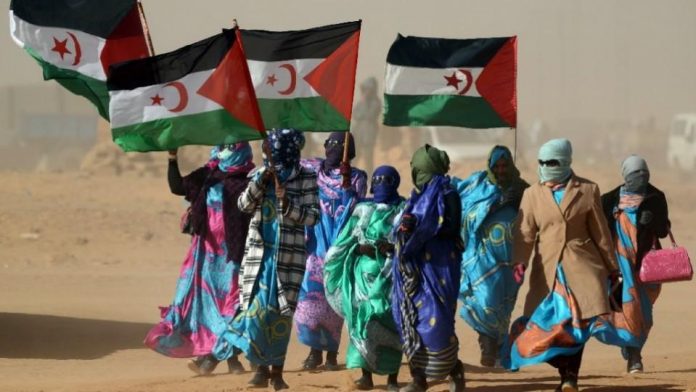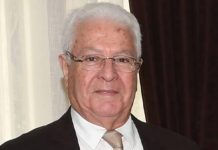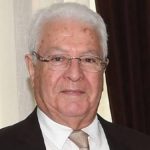ALGIERS- The UN Security Council will hold, this October, four sessions to discuss the latest developments of the Western Sahara issue, including the mandate of the United Nations Mission for the Referendum in Western Sahara (MINURSO), in light of the Moroccan continued intransigence and rebellion against international legitimacy and all international efforts to resolve the conflict in Western Sahara.
In this vein, the Personal Envoy of the UN Secretary-General for Western Sahara, Staffan de Mistura, will present his special report on the situation in the occupied territories, with consideration of the mandate of the MINURSO mission, which will end on October 31.
According to the work program and agenda of the UN Security Council sessions for the month of October, the Western Sahara file will be discussed and consulted, especially the renewal of the mandate of MINURSO, through working sessions and meetings to be held on the 3rd, 10th, 17th and 27th of this month.
During the sessions of the Security Council that will be held under the presidency of the State of Gabon, the members are expected to hear a briefing on the Western Sahara file, presented by the Special Representative of the Secretary-General of the United Nations in Western Sahara, Head of MINURSO, Alexandre Ivanko, and the Personal Envoy of the UN Secretary-General Staffan de Mistura, as well as the question of extending the mandate of MINURSO.
The discussions of the UN Security Council come in light of the collapse of the 1991 cease-fire on November 13, 2020, and the ongoing war between the Sahrawi People’s Liberation Army and the Moroccan occupation forces.
Western Sahara has been on the decolonisation agenda of the UN and AU for more than fifty years. In 1963, Western Sahara was included on the list of non-self-governing territories under Article 73 of the UN Charter and the UN General Assembly resolution 1514 (XV) of 1960 on the Granting of Independence to Colonial Countries and Peoples.
On November 6, 1975, Morocco launched the so-called ‘Green March’, a march of 350,000 Moroccans, a number four times the size of the Sahrawi population back then, into the territory of Western Sahara.
According to Adala UK, on that day, Morocco organized what it called a “Green March” to officially invade the North of Western Sahara moving 350,000 Moroccan settlers to the territory. This occupation coincided with the termination of the Spanish status as Administrative Power, creating a vacuum that imposed on the UN to assume its responsibility there.
Subsequently, the UN Security Council deplored the holding of the march, calling upon Morocco to immediately withdraw all the demonstrators from the territory of Western Sahara; however, its effort was in vain.
The Polisario Front liberation movement continued its struggle to end all foreign occupation of its country and in 1976 formed a government-in-exile and declared the Saharawi Arab Democratic Republic. In November 1984, the Polisario Front’s SADR was recognised by the then Organisation of African Unity (OAU), now the African Union (AU), which led to the withdrawal of Morocco from the OAU in protest. In May 1991, the Polisario Front and Morocco ended many years of fighting following an UN-sponsored peace settlement, culminating in the establishment of the UN Mission for the Referendum in Western Sahara (MINURSO), which is assuming its responsibility till nowadays.
Despite a cease-fire in 1991 that put an end to the armed combat, Western Sahara remains a disputed territory. Nowadays, Morocco controls parts of the territory. However, the United Nations refers to Western Sahara as a non-self-governing territory and maintains a stance favoring self-determination for its people.
The UN body is attaching great interests to the Sahrawi cause, expressing willingness to find a solution ensuring the self-determination of the Sahrawi people, in accordance with the relevant resolutions of the Council.
After almost 30 years of compliance with a 1991 ceasefire, Morocco and the Polisario Front have resumed war in Western Sahara, as Morocco torpedoed the 1991 ceasefire through its act of aggression on the Sahrawi Liberated Territories on 13 November 2020.
The Moroccan new act of aggression has not only ended the ceasefire and related military agreements but has also undermined the UN peace process in Western Sahara and plunged the region into another spiral of extreme tension and instability.
Both the UN Secretary-General and the Security Council have confirmed the breakdown of the 1991 ceasefire on 13 November 2020. In his report (S/2021/843; para 2) dated 1 October 2021, the UN Secretary-General acknowledged, among other things, “the resumption of hostilities” between the occupying state of Morocco and the Frente POLISARIO. For its part, in its resolution 2602 (2021) adopted on 29 October 2021, the Security Council noted “with deep concern the breakdown of the ceasefire” (PP 14).
The acknowledgment by both the UN Secretary-General and the Security Council of the breakdown of the 1991 ceasefire and the realities on the ground render any attempt to deny or underplay the seriousness of the current situation in MINURSO’s area of operation unacceptable and even misleading at a time when the occupying state of Morocco continues its aggression on the Sahrawi Liberated Territories and its deliberate targeting and killing of civilians and destroying their properties.
The final status of the state of Western Sahara will only be settled when a UN-supervised referendum is held in which the country’s inhabitants must exercise their legitimate right to self-determination.




























